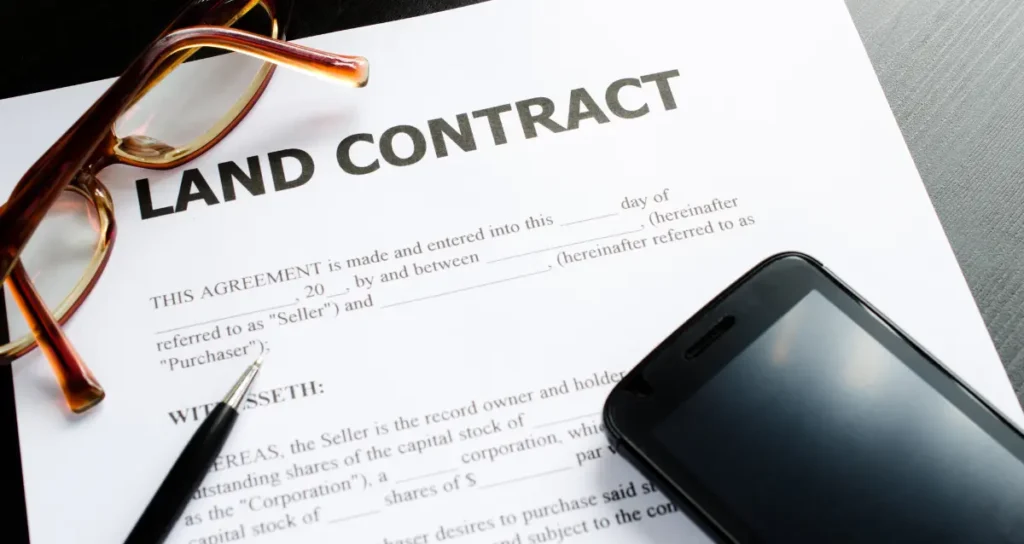How to Buy Land with No Money Down
Owning land can be a valuable investment and a pathway to building generational wealth. However, the upfront costs associated with land purchases can be a significant barrier for many aspiring landowners. Fortunately, there are several strategies that allow you to buy land with little or no money down. In this article, we’ll explore various options and provide practical tips for acquiring land without breaking the bank.
How to Buy Land with Little or No Money Down:
Quick Tip
- Conduct thorough title searches, surveys, and environmental assessments to ensure clear ownership, compliance with zoning laws, and identification of potential hazards before finalizing any land purchase.
Understanding Land Ownership
Land Ownership Types
Before delving into the strategies for buying land with no money down, it’s essential to understand the different types of land ownership. Land can be classified into several categories, including residential, commercial, agricultural, and undeveloped. Each type of land has its unique characteristics, zoning regulations, and potential uses.
Benefits of Owning Land
Owning land offers numerous advantages, such as the potential for appreciation, the ability to develop or build on the property, and the freedom to use the land for various purposes, subject to local laws and regulations. Additionally, land ownership can provide a sense of security and a legacy for future generations.

Strategies for Buying Land with No Money Down
Owner Financing
Negotiating with Landowners
One of the most common and effective strategies for buying land with no money down is through owner financing. This involves negotiating directly with the landowner to finance the purchase of their property. The key is to approach landowners who own their land outright and are willing to act as the lender.
When negotiating with landowners, it’s essential to present a compelling case that highlights the benefits for them. Emphasize the potential for a steady stream of income through the monthly payments and the opportunity to earn interest on the sale. Be prepared to offer a higher purchase price or a higher interest rate to sweeten the deal.
Setting Up Payment Terms
Once you’ve found a willing landowner, the next step is to establish the payment terms. This typically involves agreeing on the purchase price, interest rate, and the length of the loan term. It’s crucial to ensure that the monthly payments are affordable and within your budget.
One strategy is to request a longer loan term, such as 20 or 30 years, to reduce the monthly payments. Additionally, you can negotiate a balloon payment at the end of the term, where you’ll pay off the remaining balance in a lump sum.
Lease-to-Own Agreements
Understanding Lease-to-Own Contracts
A lease-to-own agreement, also known as a rent-to-own or lease-purchase agreement, is another option for acquiring land without an upfront purchase. In this arrangement, you enter into a contract with the landowner where you agree to lease the property for a specified period, typically several years.
During the lease term, a portion of your monthly rent payment is applied toward the eventual purchase of the land. At the end of the lease term, you have the option to purchase the land at a predetermined price, often at a discount from the original market value.
Advantages and Disadvantages
Lease-to-own agreements offer several advantages, such as the ability to build equity over time and the flexibility to walk away from the deal if circumstances change. However, it’s essential to carefully review the contract terms and understand the potential risks, such as the possibility of losing any equity you’ve built if you fail to exercise the purchase option.

Land Contracts
What is a Land Contract?
A land contract, also known as a contract for deed or an installment sale, is a unique financing arrangement where the landowner acts as the lender, and you, the buyer, make periodic payments directly to them. Unlike a traditional mortgage, the landowner retains the legal title to the property until the final payment is made.
Pros and Cons of Land Contracts
Land contracts can be advantageous for buyers with limited credit or access to traditional financing. They often have more flexible qualification requirements and may require little or no down payment. However, buyers should be aware that they may not have the same legal protections as with a traditional mortgage, and the landowner can potentially reclaim the property if payments are missed.
Partnerships and Joint Ventures
Finding Potential Partners
If you lack the financial resources to buy land outright, consider forming a partnership or joint venture with others who share your investment goals. This approach allows you to pool resources and share the risks and rewards of land ownership.
Potential partners could include family members, friends, or even investors interested in real estate ventures. Networking and attending local real estate events can also help you connect with like-minded individuals.
Structuring the Partnership
When forming a partnership or joint venture, it’s crucial to clearly define the roles, responsibilities, and financial contributions of each party. Consult with legal professionals to draft a comprehensive partnership agreement that outlines the ownership structure, decision-making processes, and exit strategies.
Due Diligence and Legal Considerations
Title Search and Surveys
Before finalizing any land purchase, it’s essential to conduct a thorough title search to ensure that the seller has clear ownership and that there are no outstanding liens, encumbrances, or disputes over the property. Additionally, obtaining a professional land survey can help identify any potential boundary issues or encroachments.
Zoning and Land Use Regulations
Land is subject to various zoning and land use regulations that can impact its potential uses and development. Research the local zoning laws and ordinances to ensure that your intended use of the land is permitted and to understand any restrictions or requirements.
Environmental Assessments
Depending on the location and history of the land, it may be advisable to conduct environmental assessments to identify any potential contamination or environmental hazards. These assessments can help mitigate risks and avoid costly remediation efforts in the future.
Legal Contracts and Documentation
All land transactions should be properly documented and reviewed by legal professionals. Ensure that you have a comprehensive purchase agreement or contract that clearly outlines the terms, conditions, and obligations of all parties involved.
Financing Options for Land Development
Construction Loans
If you plan to develop or build on the land, you may need to explore construction loans. These specialized loans are designed to finance the costs associated with building projects, such as materials, labor, and permits.
Land Loans
In some cases, you may be able to secure a traditional land loan from a financial institution. These loans are specifically designed for purchasing raw land and may have different qualification requirements and terms than traditional mortgages.
Private Lenders and Hard Money Lenders
Private lenders and hard money lenders can be an alternative financing option, particularly for those with limited credit or unique circumstances. These lenders typically offer short-term loans secured by the land itself, but often at higher interest rates and with stricter terms.
While private and hard money lenders can provide a solution when traditional financing is unavailable, it’s important to carefully evaluate the costs and risks associated with these types of loans.
Conclusion
Buying land with no money down is a viable option for those with limited financial resources and a strategic approach. By exploring strategies such as owner financing, lease-to-own agreements, land contracts, and partnerships, you can overcome the initial capital hurdles and embark on your journey toward land ownership.
However, it’s important to exercise due diligence, understand the legal implications, and carefully evaluate the potential risks and rewards of each approach. Seek professional advice from real estate experts, attorneys, and financial advisors to ensure that you make informed decisions that align with your long-term goals.
Remember, land ownership is a long-term investment that requires patience, perseverance, and a willingness to explore unconventional paths. With the right strategies and mindset, you can unlock the door to a world of opportunities and build a legacy for generations to come.
FAQs
Can I really buy land with no money down?
Yes, it is possible to buy land with no money down by exploring strategies such as owner financing, lease-to-own agreements, land contracts, and partnerships. However, these methods often involve negotiating favorable terms and may require a higher purchase price or interest rate.
What are the risks of owner financing?
While owner financing can be a great way to buy land with no money down, there are risks involved. The landowner may have the right to reclaim the property if you fail to make payments, and you may have fewer legal protections compared to a traditional mortgage.
How do I find landowners willing to offer owner financing?
Networking, attending real estate events, and working with real estate professionals can help you connect with landowners who may be open to owner financing. Additionally, you can research public records or contact landowners directly to inquire about their interest in such arrangements.
Can I get a mortgage after buying land through owner financing or a land contract?
Yes, in many cases, you can refinance and obtain a traditional mortgage after buying land through alternative financing methods. However, lenders may have specific requirements, such as a certain amount of equity or a minimum ownership period, before approving the refinance.
What should I consider when forming a partnership or joint venture for land ownership?
When forming a partnership or joint venture, it’s crucial to clearly define roles, responsibilities, financial contributions, decision-making processes, and exit strategies. Consulting with legal professionals to draft a comprehensive partnership agreement is highly recommended to protect the interests of all parties involved.
FURTHER READING







